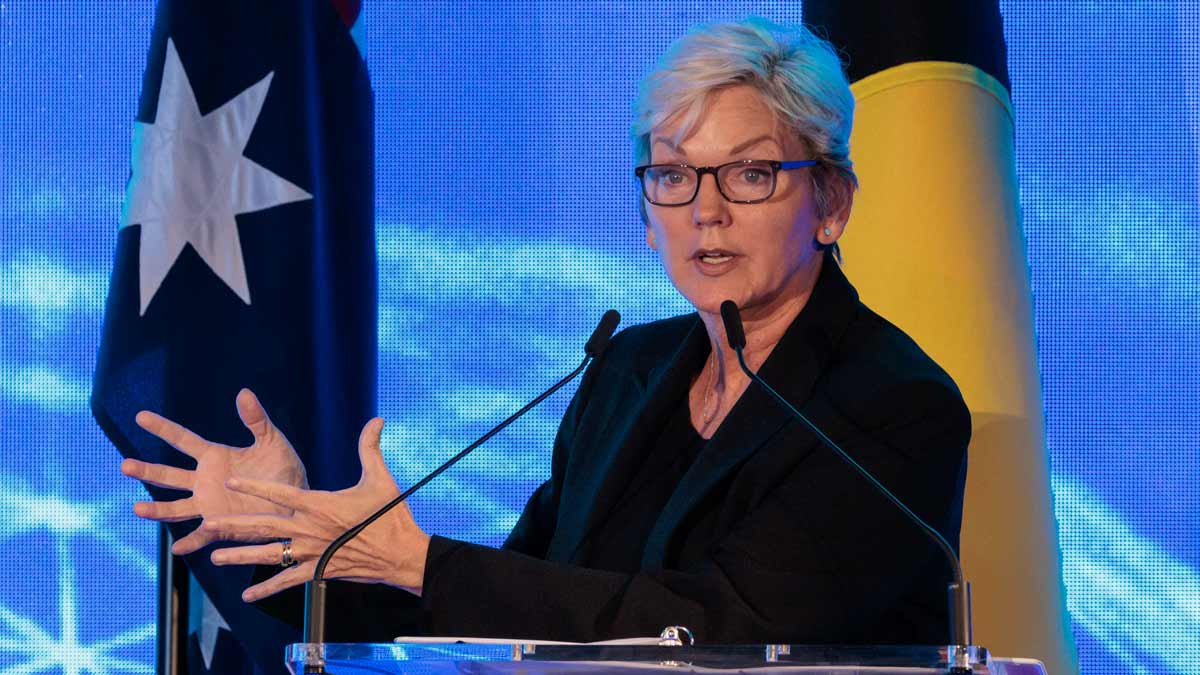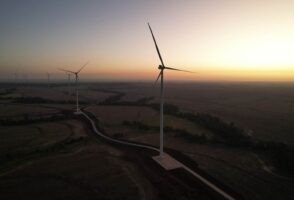A global transition to cleaner energy sources could be the world’s best opportunity to minimise the chance of global conflicts, the US energy secretary has told a major energy forum in Sydney.
In an address to the Sydney Energy Forum on Tuesday, US energy secretary Jennifer Granholm said the switch to cleaner energy sources meant no country could be “held hostage” over its access to solar and wind resources.
“No country has ever been held hostage to access to the sun. No country has ever been held hostage to access to the wind. They have not ever been weaponised, nor will they be,” Granholm told the forum.
“So, therefore, our move to clean energy globally could be the greatest peace plan of all.
“We want and need to move to clean energy, and we share this with Australia. We have ample sunshine and lots of land for solar and wind farms. Coasts with an opportunity for offshore wind skilled workforce.
“But we see our opportunity as exporters of clean energy to be able to play a role in bringing that peace plan to the world,” Granholm added.
Granholm was speaking in the context of a major crisis facing global energy markets, primarily triggered by the Russian invasion of Ukraine.
Russia is a major fossil fuel exporter, particularly to Europe, and has dramatically cut supplies of fuels to European countries opposed to Russia’s invasion.
Granholm told the forum that like-minded countries like Australia and the United States needed to work to establish their own supply chains for clean energy technologies, to avoid a repeat of conflict-driven pressures on access to energy technologies.
“China has a big foot in a lot of the technology and supply chains that could end up making us vulnerable if we don’t develop our own supply chains,” Granholm said.
“And so therefore, from an energy security point of view, it is imperative that nations that share the same values to develop our own supply chains, not just for the climate, which of course is very important, but for our own energy security.”
“We’ve seen what happens when we rely too much on one entity for a source of fuel.
In his own address to the forum, executive director of the International Energy Agency, Fatih Birol, said the world is in the midst of the “first global energy crisis”, intensified by Russia’s status as both the instigator of the recent conflict and a major fossil fuel exporter.
“Oil, natural gas, coal and electricity prices are going up, through the roof. Why? it is very simple: Russia, the country that invaded Ukraine in February, was the number one oil exporter of the world, the number one natural gas exporter of the world, and a major player in the coal markets,” Birol said.
“And as a result, we are seeing that the entire energy system is going through a crisis.”
Both Granholm and Birol were speaking at the Sydney Energy Forum, convened co-hosted by the Australian government, the International Energy Agency and the Business Council of Australia.
IT forms part of the efforts of the new Albanese government to rehabilitate Australia’s reputation as an actor on climate change and a backer of green energy technologies.
Granholm has been similarly tasked with restoring international confidence in the United State’s commitment to climate action, after the destructive period under the Trump Administration that included a withdrawal from the Paris Agreement.
The Biden administration has set itself a target of transitioning the United State’s electricity system to 100 per cent ‘clean’ electricity as early as 2035. Granholm said the timeline required both an ‘aggressive’ and ‘orderly’ transition of the energy system.
“As we are aggressively building out this clean energy future, we have to make sure that it is done in a managed way, we have to make sure that it is an aggressive, orderly transition, and not a disorderly one, because that could set us back,” Granholm said.
“The President of the United States is very enthused about growing the clean energy pie by building out clean.”
“This transition, in the United States – we have 13 years before we get to 100 per cent clean electricity – it is not just a flipping of a switch, it is a period of time that allows us to do this in a way that achieves buy-in, and that is still very aggressive.”










